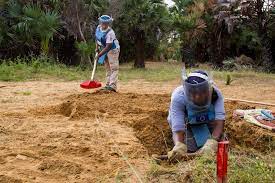Muhamalai: mine clearance completed in one of the world's worst minefields
The HALO Trust has completed demining in a large area of Sri Lanka’s Northern Province, which was fought over by Sri Lanka’s army and the Tamil Tigers for years. The local population was fundamental in removing the mines. Now locals will be able to get back the lands that had been taken from them during the long civil war.
Colombo (AsiaNews) – Sri Lanka has received some long-awaited good news, with a large part of the island nation made safer.
Last week, the HALO Trust, the largest humanitarian organisation for mine clearance, completed the process of demining northern Muhamalai (Northern Province) in cooperation with a major Sri Lankan demining agency.
Thanks to decades of joint efforts, residents, once displaced by war, can finally return to their homes. Observers note that Muhamalai was one of the densest minefields in the world.
During the fighting, the Forward Defence Line separated Sri Lanka Army (SLA) positions in Jaffna from those of the Liberation Tigers of Tamil Eelam (LTTE) in Kilinochchi.
Landmines were used extensively and systematically by both sides, as fighting intensified for access along the famed A9 Highway. As a result, many northerners now live in resettled communities, rebuilt with government assistance.
The country is expected to be declared free in 2028 from the threat of anti-personnel mines.
The National Mine Action Centre (NMAC) oversees the quality assurance and control of mine clearance work, and its officials visit demining sites every two weeks to ensure that operations follow Sri Lankan and international standards.
At present, demining is also underway in the Muhamalai lagoon, which is considered a challenging area due to seasonal access and the complexity of the terrain.
An amphibious excavator is being used to reach the shallow mined lagoon, plus IED-protected machinery; yet, the progress is slow due to the presence of active minefields on either side of the access paths as the area is in a “red zone”.
The HALO (Hazardous Area Life-support Organisation) Trust is a humanitarian NGO that works primarily to clear landmines and other unexploded explosive devices left in the ground during wars. It employs more than 10,000 staff in 28 countries. Its main commitment at present is in Afghanistan, where it operates under the Taliban regime that took power in August 2021.
According to HALO Trust International Operations Manager Vithoozen Antony, “The farms in the area (northern Muhamalai) were turned into frontlines when I was in primary school. Now I am working in a team returning those displaced by the war to the lives they belong to.”
Like thousands of people in the North, his childhood was cut short by the war and displacement. He now leads teams of hundreds of people, mostly from local communities, in the painstaking task of extracting one of the world’s deadliest weapons of war.
Suhashini Vadivel (54), Suppamma Ravichndrarajah (50), and Arul Jeyeprgasan (48), residents of Muhamalai, have been trained to work as deminers.
“We joined the demining programme because we wanted to clear our lands,” they said, speaking to AsiaNews. “There were many mine accidents during the during training period. Our families attempted to dissuade us from joining the mining operation. We will work here as long as the mines last. We need to return to our ancestral properties.”
“Our work is hard as demining shifts are from 6 am to 12 pm and 12 pm to 6 pm. Those working in the morning shift often wake up as early as 2 am to manage household chores before joining the shuttle bus at 4 am to reach the site. We work in 40-minute intervals with 10-minute breaks, wearing heavy protective gear under the intense northern sun.”
“For many deminers like us, demining is a vital lifeline supporting our families. Most are former LTTE cadres, rehabilitated fighters along with approximately 60 per cent of HALO Trust staff. Majority of deminers are women, as due to the war numerous households are headed by women.
“All demining staff have mandatory insurance under the employer’s coverage, and childcare is provided. Although, our work is hard, we are happy as we can return to our former residences and start our livelihoods.”
As more minefields are cleared with the goal of making Sri Lanka a landmine-free nation, hundreds of demining jobs will be lost. To prepare for this, the Mines Advisory Group (MAG) is spearheading a programme to train deminers for other jobs.
According to the NMAC, some demining staff have already received training in financial management, language and performing arts. Vocational training projects in tailoring, welding, and handicrafts are also underway.
20/03/2018 14:09
09/06/2021 14:33







.png)










